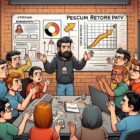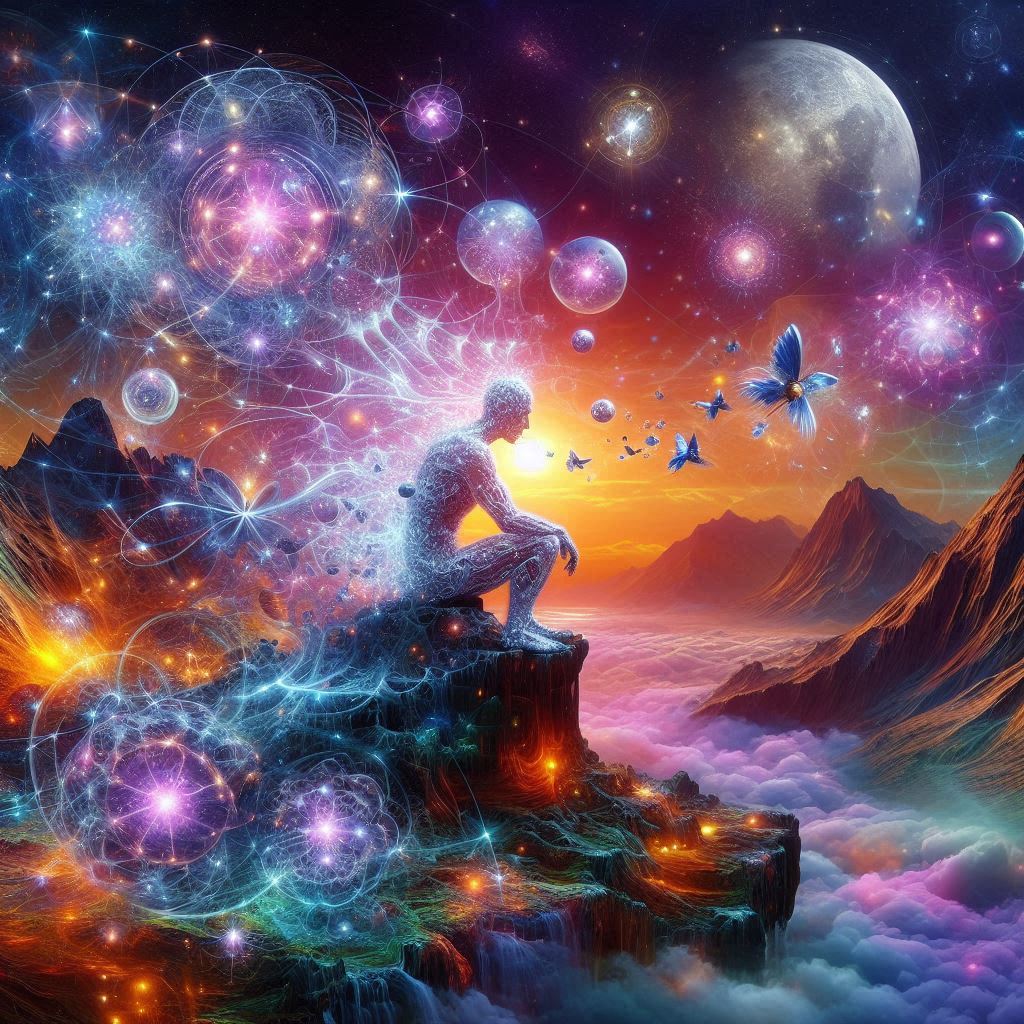In order to understand the problem I want to picture here, I need to tell you what I mean with media. I should also add that I don’t want to criticize collectors of certain media types – which is more of a hobby that not connected to the problem. This post might be a little mixed up, but if you know this blog you also know that I’m not the best writer in the world. Not yet at least ;-)
 What is Media
What is Media
You think media means music, videos, TV and the newspapers, and thats true, but there is a lot more out there that you oftentimes don’t recognize as media. Media is a either a more or less unlimited channel of content (TV, internet in general, radio, a library) or a set size of content (a music album, a book, a video, a videogame, a magazine, a blogpost, a newspaper). The “content” is what’s tickling your fantasy, mind, interests, thirst for knowledge, imagination, anxiety, … or just lets your brain consume stuff so it is freed from the hard work of thinking itself. You could even argue that other people talking to you are a stream of content and therefore media. All these contents influence you and your ways of thinking.
 photo credit: dearsomeone
photo credit: dearsomeone
The Problem
Technically, oftentimes you’ll find digital media bound to storage like CDs, DVDs or a lot of dead trees (formally known as paper). I never understood people hoarding their music-CDs, and their videos, be it on tape, VHS casette or DVD ar BD – even if I know a lot of people who do that. As a kid (when you watch movies dozens of times) I might have liked that myself, but since the dawn of digital media, I don’t see the point anymore at all.
The advantage of having collections of media around is that you can show off what you have, and what you’re interested in. It’s like wearing a T-shirt or your favourite movie or band: everyone instantly recognizes that interest of yours – that you’re into something. The opposite is like saying you’re a fan of Star Wars without having action figures, T-shirts or lightsabres around: people don’t instantly know.
 Books are media too. I also didn’t understand why to keep books around that you have read before, if it isn’t non-fiction books you might need to cite from or look up from time to time. Same thing with magazines. Nobody would hoard all of their daily newspapers, but some are keeping magazines. And with fiction books, its the same as with movies: you just don’t read or watch them more than once. And if you do, you would most likely get off cheaper if you rented them twice instead of buying them once.
Books are media too. I also didn’t understand why to keep books around that you have read before, if it isn’t non-fiction books you might need to cite from or look up from time to time. Same thing with magazines. Nobody would hoard all of their daily newspapers, but some are keeping magazines. And with fiction books, its the same as with movies: you just don’t read or watch them more than once. And if you do, you would most likely get off cheaper if you rented them twice instead of buying them once.
The point of keeping books around that you might need for reference also diminishes quickly: you can keep digital versions of books and read them on screen, on your ePaper device or even your smartphone. Reusing music is common, but stories, news and movies are also not used much more often than maybe once or twice.
Availability
Music is available through a multitude of services: either you rip them from your CD and keep it on a harddrive (or even in the cloud), sharing it with you game console and all your other household networked things. Or you buy them via iTunes and just stream them from there to anywhere. Or you use Pandora, Last.fm and all the other free music stations in the net, or the usual old radio stations which are all available digitally streamed.
Apart from music, nearly everthing else is available for download, be it in a paid version as with rented movies, music tracks or eBooks or in a free version as with a limitless source of information in form of blogposts or news. Having media bound to physical objects needs to to have them around in one place and to carry their weight if you need them somewhere else.
Prices
- Buying movies on disc isn’t too cheap. If you get a cheap 3 for 1 BD box, you might be paying 20€ if you’re lucky, but usually it’s more expensive. As opposed to renting it in a video renting service for 2,40€ per movie you can rent a movie for 2,99€ via online renting (and therefore not paying for fuel and use less time to get it) in iTunes, Playstation Network or a lot of other services I didn’t even try out.
- Buying music digitally is basically the same price as buying them in the real store. But here you can get the two songs you really like instead of the 12 tracks you don’t really want much cheaper. And you already have all the metadata included. I mean I don’t see too many people still walking around with “discmans”, so to get their stuff on their custom media player, they’d need to rip it and add all the metadata in a time consuming way.
- (Many people say they’d miss the artwork and booklet on the digital thing. To me, this is stupidity. Yeah, I also read the booklets back then, but times are changing. Enter the World Wide Web. Just head to the artists website, we’re not in the eightees anymore. There you’ll find much more artwork than you can ever hope to fit into some paper booklet. Oh, and you’ll find the lyrics there too.)
- Buying eBooks isn’t more expensive than buying a “real” book. Here the market still didn’t finish converting to the digital medium as often fiction books are still not avaible in open ebook formats, but you can see it happening faster and faster, and soon the rainforests can rejoice when all people have Kindles and iPads around and can easily obtain digital versions.
- News and information basically cost nothing. You can of course buy well researched or well authored stuff, but those authors have to fight the free price you get though the free news websites.
- Games are same price online or offline, if you can get them online. But games are a special case, because most of the publishers still stick to the old distribution model. If you’re looking at the Apple appstore, digitally distributed games might even be much cheaper than games bound to boxes, discs and paper, but that will soon be known when the Mac appstore becomes tested and when Microsoft copies the concept.
- (TV and Radio was always distributed in a way that wasn’t bound to physical objects other than the receiving machine. Not much change there, other than the quality of non-paid TV broadcasts diminishes while paid services are like a flatrate for content.)
And there’s another price people don’t think about: either you spend time getting your analog media, or you pay for postage and packing that wouldn’t be necessary if you downloaded the digital versions.
Conclusion
Digital Media does not rot. After about 10 years, a CD or casette might even be unreadable and thereby broken. Digital media can be copied an infinite number of times and you can create as many backups as you want.
The main point of this post is that analog media is written on three dimensional stuff that just takes up a lot of space. For that space, you usually pay rent (or pay interest on loans in my case). Therefore, your media should pay a part of your rent. But it doesn’t. So please understand that media is about content, and not about collections of paper, CDs, DVDs and such. The digital versions are much more economic, overall cost less time and money to obtain and are better for the planet’s ecological environment.






Nach zwei Tagen internationaler Konferenz zum Thema Open Access Open Data, bin ich gerade zu fertig um in englisch zu antworten.
Ich verstehe deinen Ansatz, aber deine Argumentation ist falsch.
1. EBooks sind teurer, allein durch den 12% höheren Mehrwertsteuersatz. Interessant wäre zu sehen, wie es in UK aussieht.
2. Content ist nicht umsonst. Es kostet immer. Und das ist die krux der ganzen Open Access Bewegung. Somit kosten auch Nachrichten und Informationen etwas. Und es gibt eklatante Unterschiede in der Qualität und Qualität kostet.
Unreferenzierte Information ist “gefährlich”. Gerade Google ist hier im Prinzip eine “Gefahr”. Die meisten Menschen verlassen sich auf die ersten 10 Treffer bei Google und denken die richtigen Informationen gefunden zu haben. Dies ist aber meistens nicht der Fall. Aber das auszuführen geht hier heute zu weit.
Content kostet, egal wie er hergestellt wird oder publiziert wird. Arbeitszeit, Kosten für Infrastruktur etc, pp. Für die meisten freiverfügbaren Informationen zahlt man ebenfalls. Sei es durch Gebühren, Subkriptionen oder indirekt durch Werbung.
Digitaler Content does rot. Bits können verloren gehen etc. pp. Vor allem aber veraltet im Moment noch sowohl das Datenformat der einzelnen Datei als auch die entsprechende Software. Und der Transfer von einem Format ins andere ist zeitaufwenig und arbeitsintensiv. Ganz zu schweigen davon, dass die meisten Menschen keine Ahnung davon haben, worauf man achten muss und wie man eine Transfer macht. (Mir fällt gerade das Fachwort nicht ein, aber du weisst sicherlich, was ich meine)
Bei den Berichten und Studien die ich kenne, zeichnet sich ab, dass die “Preservation” von digitalem Inhalt ziemlich genauso viel kostet wie die Archivierung und Aufbewahrung von Büchern und Zeitschriften.
JISC hat dazu eine Studie erstellt und die Allianz “Digitale Information” hat ebenfalls eine Studie zum Thema Hosting erstellen lassen, in der es auch steht.
Der Vorteil von Büchern ist, dass für Sie keine Software und keine Hardware benötigt wird, sie stehen immer zur Verfügung. Und können in ihrer einmal erstellten Form auch hundert Jahre später genutzt und gelesen werden ohne großen Aufwand. Die Sprache selbst ist im digitalen als auch analogen Bereich das selbe Problem. Insofern ist und bleibt das Buch immernoch das bessere Speichermedium, weil die Accessability langfristig gesichert ist.
Und du kennst sogar jmd der Tageszeitungen sammelt und archiviert: Herr Jähnert macht das!
Die Grundsätzliche Frage ist aber, ob man durch digitale Bücher und Zeitschriften nicht dennoch Geld sparen kann. Im Moment ist dies durch die bestehenden Copyrights und andere Rechte nicht möglich, aber es könnte ja auch eine Digitale Bibliothek geben, in der du einfach selbst ausleihst und die Bücher/Artikel auf deinem entsprechenden Lesegerät liest und dann wieder löscht. Die Speicherung, Aufbereitung und Archivierung wäre dann nationale oder internationale Aufgabe, die vom Staat/dem Steuerzahler generell bezahlt wird, der einzelne zahlt selbst nichts mehr und durch eine Kostenbündel und andere Effekte liessen sich schon Einsparungen erzeugen.
Hier muss man mal sehen, was Europeana, und die deutsche Digitale Bibliothek auf Dauer erreichen. Wichtig wäre, dass dieser Dienst dezentral angelegt ist und keinen Profit erzeugen will. Da sonst auf Grund des Monopols wieder neue Probleme entstehen.
Letztlich bleibt es eine Frage des persönlichen Geschmacks eines jeden, ob er lieber Bücher sammelt und sie ins Regal stellt oder aber auf Festplatten speichert.
Von deinem Professionellen Hintergrund kann ich deine Argumentation natürlich verstehen, aber ich meinte mit diesem Artikel den Endanwender und keine Bibliotheken / Archive. Und für den sind digitale Medien definitiv ökonomischer.
– MP3s gibt es seit 12+ Jahren, und ein Formatwechsel ist nicht in Sicht. Im Videobereich wird der Formatkrieg für den .avi Nachfolger gerade ausgetragen. Für Bücher gibt es momentan eigentlich mit epub schon ein offenes Format.
– Content is zwar nicht kostenlos, aber es gibt immer kostenlose Produzenten von “schlechter geschriebenem und recherchierten Content”, weshalb professionelle Content-Produzenten größere Konkurrenz und somit geringere Profite haben.
Dein Artikel ist eine Sichtweise, mir fehlt bei den ganzen digitalen Medien die Haptik, das Artwork, das spezielle Gefuehl beim Konsumieren. Digitale Formate sind das Fast Food, man wird zwar satt aber irgendwas fehlt einfach. Klassische Medien sind das Slow Food, das Komplettpaket. In meinem technischen Umfeld gibt es eigentlich Niemanden der ein Buch gerne auf dem Bildschirm liest.
Das schnelle Konsumieren der digitalen Medien hat auch dazu gefuehrt, dass kaum einer die geistigen Leistungen dahinter noch honoriert. Kaum eine Band lebt heute noch von Ihren Plattenverkaufen. Dass fuehrt zu immer kostenguenstigeren Aufnahmemethoden und ergo zu schlechterer Qualitaet der Musik.
Ob EBOOKS MP3’s oder Videos , meist wird illegal gedownloaded. Und wenn man kauft sind die Daten meist fuerchterlich mit DRM versaut.
Erstmal: klar ist das eine Sichtweise, und es gibt eine Sichtweise pro Mensch auf der Welt. Ich will nur meine erklären. Niemand verbietet Bücher, CDs und DVD-Videos. Ich sage ja nur: physische Medien verbrauchen VIEL Platz. Nun zu deinem Kommentar:
– Die illegalen Downloads werden sich nie verhindern lassen. Es gibt immer Menschen mit begrenzten Mitteln oder krimineller Energie, die Raubkopieren werden.
– Die “alten Medien” sterben. Sorry, aber eBook Reader sind recht beliebt, und die eBooks werden billiger werden. DiscMans habe ich in den letzten 2 Jahren nicht mehr gesehen, sondern nur noch MP3 Player und Telefone, die MP3s abspielen. Wozu soll ich mir eine CD kaufen, wenn ich dann die Daten runterippen muss um sie auf meinen MP3 Player zu kopieren.
– Bands werden nie wieder viel Geld verdienen, ob man nun ihre CDs kauft oder nicht (wenn verdienen die Labels). Ich habe sogar letztens von einem Professionellen Musiker gehört, dass seine Bands am meisten Einnahmen für iTunes Downloads bekommt. Überraschung!
– Ich kenne niemanden, den DRM wirklich stört, wenn es gut gemacht ist. Amazon’s eBooks beispielsweise kann man auf allen Plattformen lesen – und mal ganz ehrlich, es gibt doch kein DRM geschütztes Format, das man nicht mit einer Google Suche, einem Download und ein paar Klicks geknackt bekommt. DRM ist außerdem nicht das Problem von elektronischen Medien, sondern von einzelnen Firmen.
– Das Artwork kann auch digital mitgeliefert werden, alles eine Frage der Technik. Das wird sich im Laufe der Zeit auch weiter verbessern. Die Haptik eines Buches hingegen ist natürlich nicht zu ersetzen, aber dann sollte man auch zum Plattenspieler zurückkehren, oder ins Konzert oder ins Kino oder vielleicht gleich ins Theater gehen.
– Medien sind schliesslich dazu da, Inhalte zu transportieren, die konsumiert werden sollen. Und wenn die Inhalte für einen zählen, dann sollte man akzeptieren, dass die guten alten Zeiten nun mal jedes Jahrzehnt weiter weg rücken und man genausogut sagen mag “Ich mag aber keinen LCD-Flatscreen, mir fehlt das Bildrauschen des Röhrenfernsehers – und das Knacken, wenn er ausgeschaltet wird”.